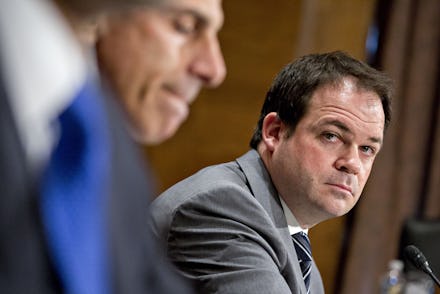Pentagon chief of staff resigns amidst growing Iran tensions

Defense Secretary Mark Esper's right-hand man is leaving his post amid growing tensions with Iran. NBC News's Hallie Jackson reported Monday that Eric Chewning resigned as Pentagon chief of staff and will leave the Department of Defense at the end of the month. Chewning had served as chief of staff to both Esper and his predecessor, acting Defense Secretary Pat Shanahan.
Chewning joined the Pentagon from the private sector in October 2017 and was selected by Shanahan to serve as chief of staff last January. He continued in the post even when Esper took the job in July. He has an extensive work history in the private sector; he was working for Morgan Stanley before enlisting in the Army after 9/11, per DefenseNews, and was a partner at McKinsey & Company before signing up with the federal government in 2017.
In a statement to DefenseNews, Esper said Chewning would be returning to private work. "In an incredibly demanding job, Eric has been a source of calm and tireless work," Esper said. "We wish him all the best."
The timing of Chewning's departure will raise some eyebrows as it comes after a weekend that raised tensions in the Middle East to the highest they've been in years. President Trump's decision last week to order the assassination of Qassem Soleimani, Iran's top military leader and considered by some to be the second-most powerful man in that country, rejuvenated antipathy toward the U.S. in the region and led to Iran vowing retaliation.
Since the deadly strike, which took place early Friday morning local time in Iraq, there has been a series of repercussions. The Iraqi parliament voted to expel all foreign troops, a move that led Trump to threaten sanctions that will "make Iranian sanctions look somewhat tame." Meanwhile, Iran has vowed "severe revenge" against the U.S., and as American troops abroad fortify their positions and brace for possible attacks, it has led to the suspension of anti-ISIS efforts from the American-led coalition in Iraq and Syria — a move experts worry could allow the terrorist group to regain its positions, especially if combined with a potential U.S. expulsion from Iraq.
Iran also announced it will no longer comply with the remaining limits on its nuclear power imposed by the 2015 nuclear deal, negotiated under President Barack Obama. Noted Iran hawk John Bolton, who left his position as national security adviser in the Trump administration last year, celebrated the announcement even as some experts worried about the likely loss of intelligence surrounding Iran's uranium enrichment progress.
Trump, for his part, has tweeted abundantly as the situation grows increasingly volatile, saying that the military has targeted 52 Iranian sites, including some that are important to "Iranian culture," for possible counterattacks. He also issued a bizarre declaration Sunday that his "media posts" would "serve as notification to the United States Congress" that should Iran attack the U.S., America "will quickly and fully strike back, and perhaps in a disproportionate manner."
University of Alabama law professor Joyce Alene noted that "reporting" around Chewning's departure "says he's ready to go back to private sector and not to read too much into this."
"But," she noted, "the timing is still quite interesting. I'd want out of that chain of command before an illegal order was given."